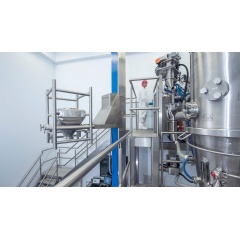Never Too Late to Learn the Basics
At an educational seminar in the beginning of February 2020 on producing oral solid dosage forms, GEA’s Dr Harald Stahl teamed up with experts from industry and academia to elucidate the fundamental relationship between granulation and tableting, discuss possible manufacturing issues and apply best practices.
During the recent “Granulation and Tableting Seminar” in Mannheim, Germany, organized by Concept Heidelberg, GEA’s Dr Harald Stahl, Head of Innovation and Strategy Pharma & Healthcare, took to the podium with Dr Michael Braun, Head of Late Stage Development at Boehringer Ingelheim, and Dr Karl G. Wagner, Professor for Pharmaceutical Technology and Biopharmacy at the University of Bonn, to discuss the fundamentals of granulation and tableting. With a particular focus on how to avoid capping, sticking and weight and content fluctuations, the comprehensive program covered “everything from raw material characterization, fluid bed granulation, high-shear processing and roller compaction to handling highly potent compounds and a comparison of the various available technologies,” noted Dr Stahl.
Hosting 35 participants from German-speaking countries (DACH), the audience comprised representatives from Big Pharma companies, smaller organizations and engineering businesses. “We had an interesting mix of R&D professionals, production staff and personnel from other functions, such as quality control and engineering,” added Harald. Dr Stahl, who gave presentations on the fundamentals of granulation, scale-up issues, high shear granulation and continuous manufacturing, moderated a troubleshooting session and chaired the overall event, commented: “The speaker profile was perfectly balanced, with talks from a supplier company, a pharmaceutical organization and academia. The three different points of view were very well received.”
With the aid of a live webcam, for instance, Prof. Wagner demonstrated the compression behavior of materials affected by (a) plastic deformation (with plasticine), (b) brittle fraction (with cornflakes) and (c) elastic deformation. He also showed how the addition of a lubricant can help to avoid material sticking to punches and dies while, at the same time, reducing the binding materials affected by plastic deformation. Dr Braun also gave an industry perspective of the “fundamentals” part of the program, which was deemed to be an excellent complement to Dr Stahl’s presentation and a valuable addition to the agenda.
During the informative and popular troubleshooting session, and reminiscent of a recent GEA article that likened pharmaceutical manufacturing to a game of chess, the take home message was that although most tableting problems only occur at the production stage, the root cause is generally either an upstream process issue (such as granulation) or a formulation error.
“It’s often the case that the R&D team develops an oral dosage form that works perfectly well on a slow-running benchtop press … but doesn’t deliver the same results when scaled up to an industrial machine,” observed Harald.
“The event showcased the magic triangle of an all-inclusive approach to raw materials, the fundamentals of granulation and tableting, and the influence of those raw materials on compression behavior. It also highlighted that the root cause of tableting issues is most often not the press and reinforced the notion that critical decisions need to made early on during development. This is when collaboration is key to ensuring that when a formulation reaches commercial-stage production, industrial-scale machines are actually capable of reaching the output values that they’ve been designed to achieve, problem free!”
“Judging by the excellent feedback we’ve received, this was a very worthwhile event that, once again, confirms the ongoing value of addressing the basics of pharma manufacturing — whatever your level of experience and time in the industry,” concluded Harald.
About GEA
GEA is one of the largest suppliers for the food processing industry and a wide range of other industries that generated consolidated revenues of approximately EUR 4.8 billion in 2018.
The international technology group specializes in machinery, and plants as well as process technology and components. GEA provides sustainable energy solutions for sophisticated production processes in various end-user markets and offers a comprehensive service portfolio. The group generates around 70 percent of its revenue in the food and beverages sector that enjoys long-term sustainable growth. As of December 31, 2018, the company employed about 18,500 people worldwide. GEA is a market and technology leader in its business areas. The company is listed on the German MDAX (G1A, WKN 660 200), the STOXX® Europe 600 Index and selected MSCI Global Sustainability Indexes
( Press Release Image: https://photos.webwire.com/prmedia/7/255121/255121-1.jpg )
WebWireID255121
This news content was configured by WebWire editorial staff. Linking is permitted.
News Release Distribution and Press Release Distribution Services Provided by WebWire.
